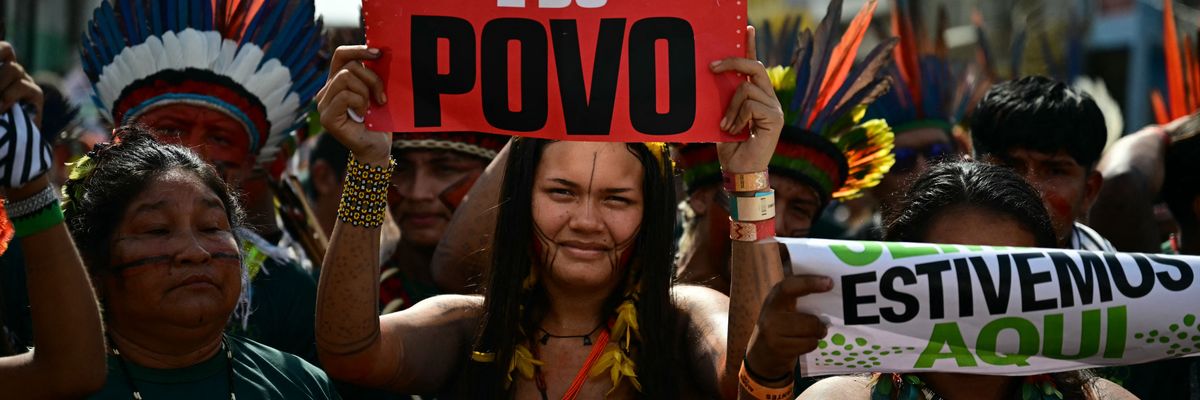Climate justice organizers on Tuesday expressed some cautious optimism that a draft text out of the United Nations Climate Change Conference in Belém, Brazil contained "building blocks" of a climate justice package that is needed to draw down planet-heating fossil fuel emissions and help the poorest and least-polluting countries confront the climate emergency—but advocates said that with just three days to go until the summit is over, the document still falls far short of delivering solutions.
The draft text, released by COP30 President André Corrêa do Lago, includes references to a "transition away from fossil fuels," and calls for annual reviews of countries' Nationally Determined Contributions (NDCs), the efforts they pledge to make to reduce their emissions.
But a day after campaigners expressed optimism about 62 countries and country groups endorsing Brazilian President Luiz Inácio Lula da Silva's call for a Transition Away From Fossil Fuels (TAFF) Roadmap, 350.org condemned the draft text for mentioning the roadmap only in paragraph 44—and excluding a fossil fuel phaseout from that section of the proposal.
The TAFF Roadmap, according to the draft, would recognize that "finance, capacity-building, and technology transfer are critical enablers of climate action."
The text also calls for "a high-level ministerial roundtable" where countries would discuss national circumstances, pathways to limiting planetary heating to 1.5°C over preindustrial temperatures, and approaches to supporting government in developing just transition roadmaps, "including to progressively overcome their dependency on fossil fuels and towards halting and reversing deforestation."
But 350.org condemned that call as an "exceptionally weak," sole reference to a fossil fuel transition, warning that "a mandated ministerial and a report... offer symbolism, not action."
"For the decision to carry credibility, the presidency must embed a fossil fuel transition roadmap directly into the 1.5°C response, not relegate it to the margins," said the group in its analysis of the document. "The roadmap must be placed in the section addressing the 1.5°C ambition gap, where it is currently absent."
Andreas Sieber, associate director of policy and campaigns for 350.org, said that "the draft text may contain the right ingredients, but it’s been assembled in a way that leaves a bitter aftertaste."
"For the decision to carry credibility, the presidency must embed a fossil fuel transition roadmap directly into the 1.5°C response, not relegate it to the margins. The roadmap must be placed in the section addressing the 1.5°C ambition gap, where it is currently absent."
"A roadmap for delivering on 1.5°C without a credible fossil fuel phaseout at its core is hollow. The COP30 presidency must heed the many parties, including President Lula, calling for a clear transition pathway and put it where it belongs: at the center of the 1.5°C response, balanced with adequate finance," said Sieber. "Without this, the overall effort will fall short.”
The group emphasized that a credible COP30 final text will include "a balanced package that delivers climate finance, strengthened adaptation measures, and a clear road map for phasing out fossil fuels."
"Without all three pillars in place, a durable and effective agreement will not be possible," said 350.org
The text mentions climate finance 26 times, the Guardian reported, and urges wealthy countries to clearly lay out their plans to provide financial assistance to the Global South—at a ministerial roundtable in one option included in the document, or through a "Belém Global De-Risking and Project Preparation and Development Facility," which would "catalyze climate finance and implementation in developing country parties by translating Nationally Determined Contributions and national adaptation plans into project pipelines."
But 350.org noted that pledges made to a global adaptation fund on Monday "once again fell short with only $133 million secured out of the $300 million target."
Fanny Petitbon, France team lead for 350.org, warned that "adaptation has long been forgotten in climate finance," and called on the presidency to ensure it has a central role in the final text.
"Crucially, the call to triple adaptation finance must stay," said Petitbon. "There is no credible ambition without supporting communities already facing the devastating impacts of the climate emergency. The presidency has begun to respond to strong demands for developed countries to pay their climate debt, which is key for rebuilding trust in all negotiating rooms."
"But the text still lacks a plan to fully deliver on the collective climate finance goal agreed upon in Baku [at COP29]—ignoring innovative sources of finance like taxing major polluters and the superrich," Petitibon added, "and fails to guarantee direct access for the most vulnerable, including Indigenous peoples."
At Oil Change International, global policy leader Romain Ioualalen said the options related to fossil fuels presented in the draft were "wildly unacceptable and a blatant dereliction of duty while the world burns."
"We don’t need a COP decision to convene a workshop or ministerial roundtable on fossil fuels. What we need is a clear collective direction of travel on how countries intend to phase out fossil fuels based on equity, and how rich Global North countries will provide finance and support to the countries that need it," said Ioualalen.
"Ministers must fix this mess," he added, "and deliver the progress that we need to make the fair and funded transition away from fossil fuels they promised in Dubai [at COP28] a reality.”




